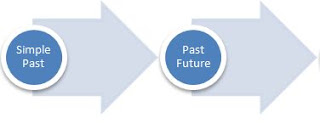Previously on my post on subjunctive, I already touched on some conditional sentence discussion. In this post, however, I would love to focus solely on this topic.
As you can see on the chart above, there are six types of tenses that are used in conditional sentences. Like the timeline diagram I gave you before, I am using this to give an overall description of it. By knowing the general description, I hope you'll get a brighter view of the topic.
- Sequel One: Unreal in the past, fact in simple past
The fact happened in the past. There is no chance that the hope/ wish was fulfilled. A past perfect event should happen first (because it is the condition or requirement for the next event to occur) and then a past future perfect event follows. The IF clause in this case is the condition so it must happen first. Here past perfect is considered more 'past' than the past future perfect.
For instance: If President Kennedy had not gone to Dallas on that doomed day (event 1), he might have still been alive for decades (event 2). The fact is 'President Kennedy went to Dallas and got shot to death'.
- Sequel Two: Unreal in the present, fact in simple present
The fact happens in the present. There is a very remote chance that the hope or wish is fulfilled. Here the first event to happen (as the condition/ requirement) is simple past event. After the condition took place, the past future event might occur. Remember that 'was' in the simple past here is NOT advisable to use in a formal context. 'Was' is normally found in conditional sentences used in casual communication. Never write "If I was ..." or say "wish it was" in academic or scientific composition.
For example: "If I were in Luna Maya's shoe (in her position), I would certainly ask for the journalists' apology". The fact is "I'm not Luna Maya so I don't ask for apology to those journalists".
- Sequel Three: True in the present/ future, fact in simple future or in simple present
The real event may happen in the present or future. The condition event is the simple present one. After the simple present event occurs, the simple future event follows/ will follow. Speaking of the grammatical structure, the subclause is the IF clause and the main clause is the result clause.
- Habits: use simple present in main clause
- General truth : use either simple present or simple future in main clause, both are correct
- A certain event : use simple future in main clause
For example:
- Habit: If my salary isn't paid on time, I usually
willlose my temper. - General truth: A patient will die (OR dies) if s/he experiences major and perpetual bleeding.
- A certain event : If Sri Mulyani and Budiono are proven to be guilty, both will face (NOT face) social and political exile by nearly the whole Indonesian citizens"
Suppose you have any questions in mind, let me know if I can be of assistance.




No comments:
Post a Comment
Tell me what you think, folks!